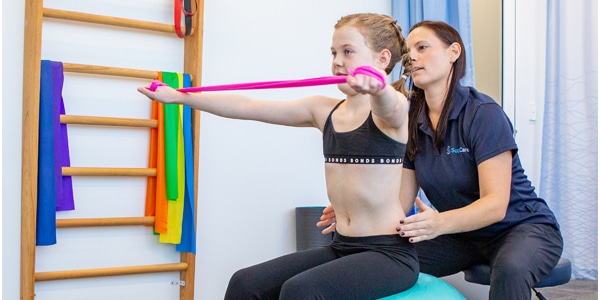ScoliBalance®
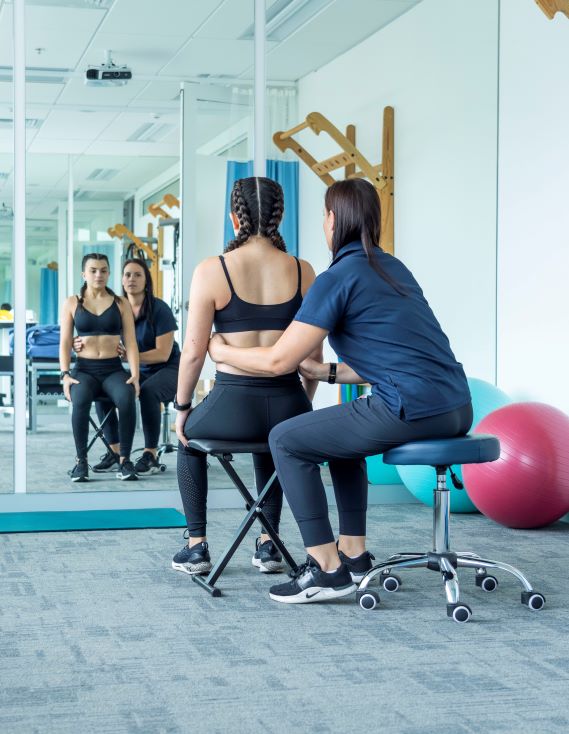
ScoliBalance®: Bringing
Balance Back to the Spine
ScoliBalance is a physiotherapeutic scoliosis specific exercise (PSSE) program used to treat scoliosis and kyphosis in children, adolescents and adults.
The program combines the most relevant practices and principles in physical therapy, chiropractic and exercise rehabilitation for a 3D approach to managing scoliosis, tailored to each individual patient according to their curve type, symptoms and treatment goals.
The ScoliBalance concept was created by Dr. Jeb McAviney (Chiropractor) drawing on his clinical experience treating scoliosis using a combination of Chiropractic Biophysics, SEAS^ and Schroth* (BSPTS) techniques.
ScoliBalance builds on the foundation of other PSSE programs focusing on aspects that are most effective and achievable for patients to learn and implement. The program is delivered in accordance with the SOSORT** guidelines (1).
Our friendly team are on hand to answer any questions you may have about ScoliBalance or treatment with scoliosis specific exercise rehabilitation approaches. Contact us.
Individualised Program
ScoliBalance provides the patient with an individualised scoliosis specific exercise program based on their curve type and postural characteristics that also addresses any relevant functional weaknesses.
- The patient is taught a scoliosis specific 3D posture correction (ScoliCorrection) that positions their spine in the straightest possible alignment.
- They then learn specific ScoliExercises with the aim of holding their ScoliCorrection while performing the exercises. Patients learn this program in-clinic and practice at home between clinic appointments.
- As the patient becomes more familiar with the program, they are taught to integrate the ScoliCorrection into their daily activities. This helps to subconsciously train the body to hold the ScoliCorrection helping to reduce or stabilise the scoliosis curve.
- The program also often uses a ScoliRoll (for scoliosis) or Denneroll (for hyperkyphosis) to enhance the correction to the spine and posture.
How can ScoliBalance help?
ScoliBalance can be used as part of a complete approach to care for patients with scoliosis or kyphosis. It may assist to:
- Slow down/stop curve progression
- Aid in the reduction of flexible scoliosis curves
- Improve coronal and sagittal balance
- Complement brace wear to help maintain the correction achieved with bracing
- Improve muscular balance and spinal flexibility
- Improve posture and body appearance
- Reduce pain
- Improve standing balance and reduce fall risk in older adults.
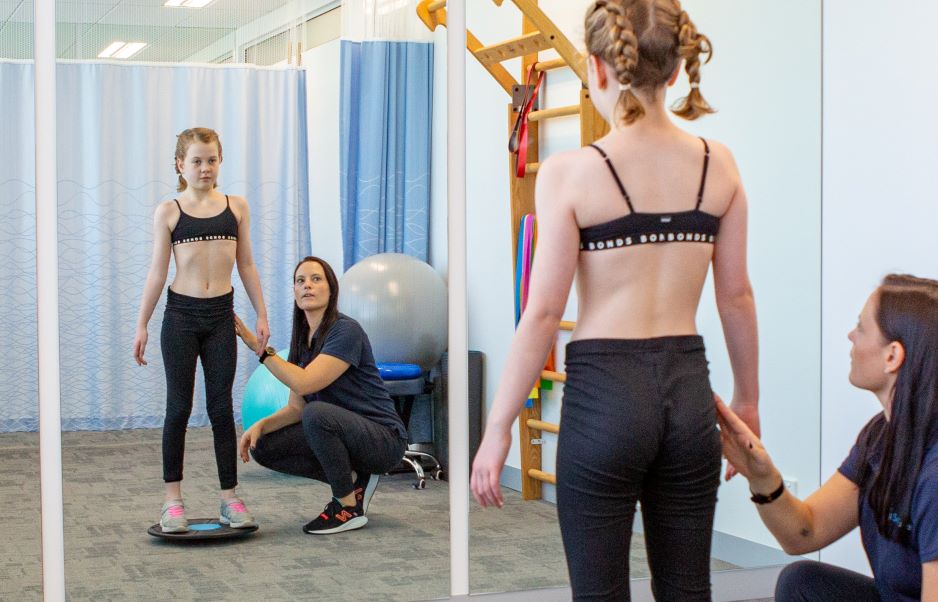
In the case of small adolescent idiopathic curves of less than 20 degrees, ScoliBalance may help to stop the curve from progressing and improve posture and body cosmetics.
ScoliBalance may also be used without bracing when a curve is non-progressive, for example, in older adolescent or young adult cases where the focus is to help improve posture, manage pain and stabilise the spine.
The principles of the ScoliCorrection used in ScoliBalance are consistent with the corrective approach used in the design of ScoliCare’s custom 3D scoliosis brace.
When ScoliBalance and this brace are combined, research (2) shows that muscle endurance and spinal flexibility can be improved during treatment.
Although not recommended, in cases where patients are wearing a different brace, the ScoliBalance program may help to counter the negative effects of other braces such as stiffening of the spine and muscle weakness.
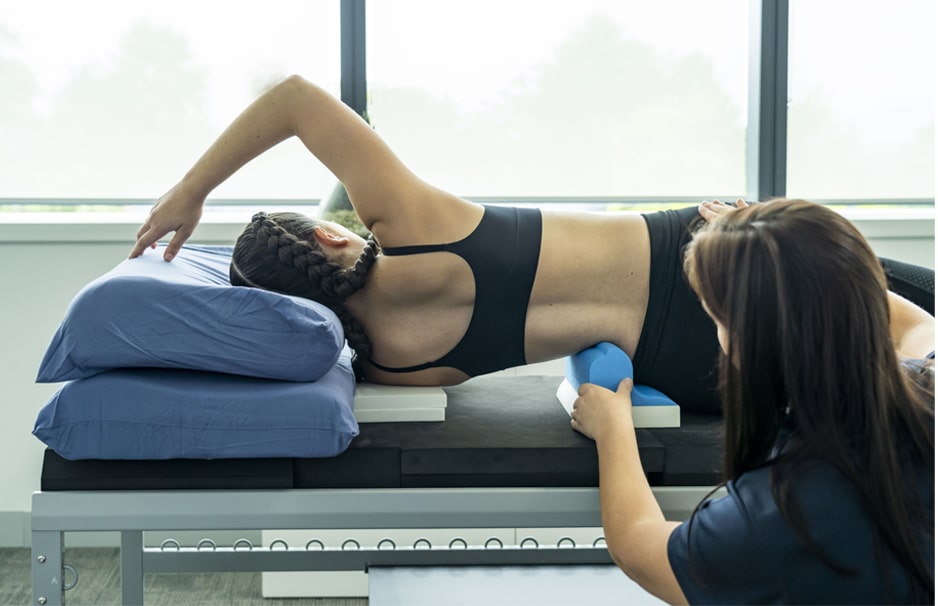
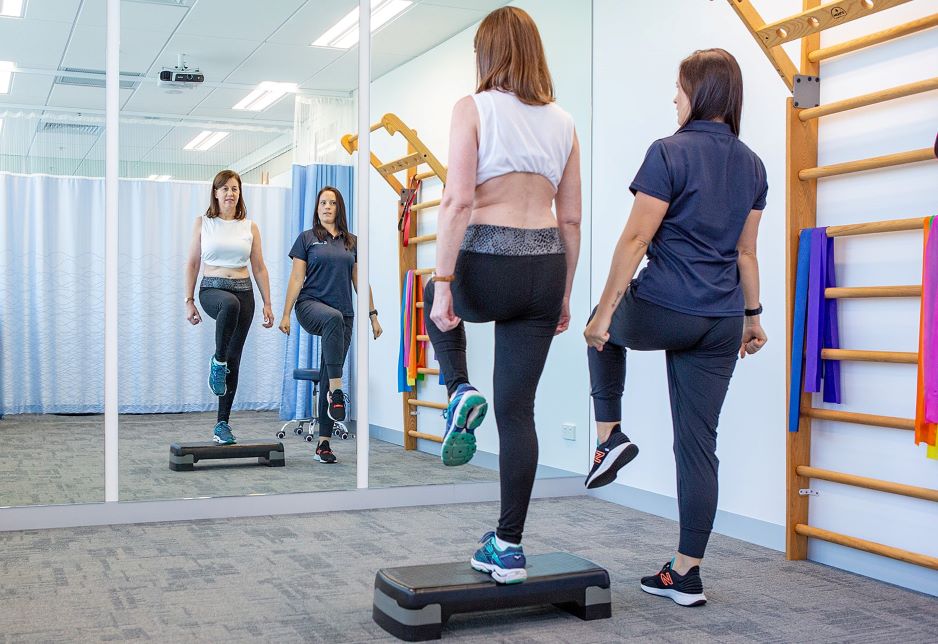
By focusing on improvements in spinal balance, ScoliBalance is effective at reducing back pain in the majority of scoliosis cases. If the curve is flexible, it may also be possible to achieve improvement to body appearance. ScoliBalance may also improve standing balance and reduce fall risk in older adults.
While ScoliBalance is very helpful in pain management, it may also aid in slowing the progression of a degenerative curve. However where degenerative progression is present, an adult custom 3D brace should be recommended.
Delivered by Experienced Professionals
- In all ScoliCare Clinics worldwide, ScoliBalance treatment is delivered by Scoliosis Rehabilitation Therapists who have specialised training in the ScoliBalance system.
- ScoliBalance is also available outside of ScoliCare Clinics through a select group of healthcare professionals who have been trained and certified in the ScoliBalance program.
- Certified ScoliBalance Providers receive extensive training via certification, practical assessment, and ongoing patient case guidance as needed, to ensure optimal patient outcomes.
Frequently Asked Questions
How does a ScoliBalance program work?
ScoliBalance is a scoliosis specific exercise program that follows the principles of the SOSORT international guidelines. In this program ScoliBalance Providers teach scoliosis specific 3D posture corrections (ScoliCorrections) so that the patient learns how to improve their posture. From there they are taught exercises (ScoliExercises) whereby they hold their ScoliCorrections while they perform exercises specifically prescribed for them. The program often incorporatees the use of the ScoliRoll (for scoliosis) or Denneroll (for hyperkyphosis) to enhance the correction to the spine and posture.
How often should ScoliBalance practice occur?
Each patient is provided with an individualised home exercise program so that they can practice at home. We recommend daily practice for 20 minutes. In addition to this the patient is often asked to use the ScoliRoll or Denneroll for up to 20-25 minutes per day (depending on each individual prescription).
Do I practice ScoliBalance in a brace?
The ScoliBalance program is often used by patients who wear a brace. Once the curve in an adolescent gets beyond a certain size (usually 20-25 degrees) then the ScoliBalance program is generally combined with bracing. ScoliCorrections should be practiced without the brace on so that the patient can achieve the best possible correction. However, sometimes the patient will also be prescribed some general strength exercises to be performed in brace.
Adults can also be taught the ScoliBalance program however the program will be modified according to the patient’s signs and symptoms.
Can ScoliBalance be used for hyperkyphosis and Scheuermann's disease?
Yes. In this instance the program is modified to account for the changes that are creating the increasingly kyphotic posture in the patient. In some cases the patient may have hyperkyphosis and scoliosis and the program can also be tailored accordingly.
Success Stories
from our Clinics
We’d like to thank our patients for their permission to use their images and results in our case studies. These studies are not to be reproduced without written permission from ScoliCare.
Case – Adult Bracing (88 year old female)
Improvement of a severe post-traumatic de novo degenerative scoliosis using a 3D designed custom scoliosis brace in an older femaleCase – Adult Bracing (87 year old female)
Female aged 87 years with adult degenerative scoliosis. Treatment of a severe scoliosis using a 3D designed custom scoliosis brace in an Older Female PatientSupportive Information:
- (1) 2016 SOSORT guidelines: Orthopaedic and rehabilitation treatment of idiopathic scoliosis during growth, Negrini et al, 2018. Paper here
- (2) Improvement of trunk muscle endurance in Adolescent Idiopathic Scoliosis
(AIS) patients undergoing ScoliBrace and Scientific Exercise Approach to Scoliosis (SEAS) treatment, SOSORT Book of Abstracts, SOSORT Lyon 2017. Paper here - Active self-correction and task-oriented exercises reduce spinal deformity and improve quality of life in subjects with mild adolescent idiopathic scoliosis. Results of a randomised controlled trial. Monticone et al, 2014 Paper here
- Scoliosis-specific exercises can reduce the progression of severe curves in adult idiopathic scoliosis: a long-term cohort study. Negrini et al, 2015 Paper here
- The effects of exercise therapy on adolescent idiopathic scoliosis: An overview of systematic review and meta-analyses. Zhor et al, 2021 Paper here
- The natural history of adolescent idiopathic scoliosis, Weinstein, 2019 Paper here
- Why do we treat adolescent idiopathic scoliosis? What we want to obtain and avoid for our patients. SOSORT 2005 Consensus paper, Negrini et al, 2006. Paper here
- *Barcelona Scoliosis Physical Therapy School (BSPTS)
**SOSORT is the International Society of Scoliosis Orthopaedic and Rehabilitation Treatment. (1) Negrini et al, 2018. - ^ Scientific Exercise Approach to Scoliosis

